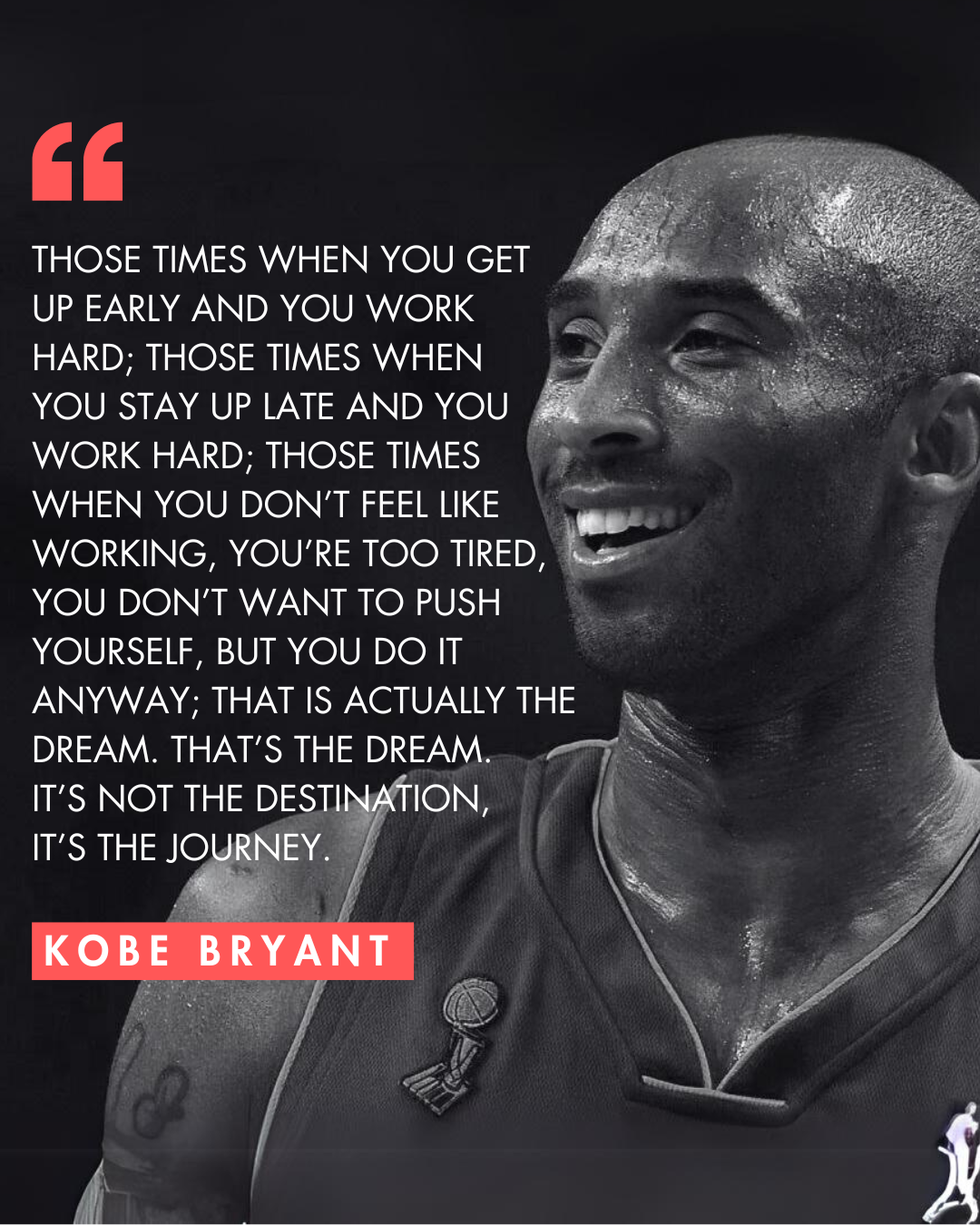Are you struggling to stay on track with your goals?
When you think of some of the most accomplished individuals in the world—whether they are athletes, scientists, artists, or business moguls—one trait consistently shines through: discipline.
Kobe Bryant, the late legendary basketball player, famously said,

For Kobe, discipline wasn't just a means to greatness; it was the path itself. He understood that achieving excellence required consistent effort, even when motivation waned.
Why Discipline Matters?
Discipline isn't confined to the court or the lab; it's equally crucial in managing our finances. If you aspire to financial freedom, discipline with money is essential.
Consider how you spend your time, where you invest your energy, and the daily choices that impact your financial trajectory. Success isn't always about monumental actions; it's often the small, disciplined decisions made consistently over time.
A disciplined approach means prioritizing your financial goals, staying focused on them, and persevering through setbacks. It's about making deliberate choices aligned with long-term prosperity rather than succumbing to immediate desires.
What is Discipline?
At its core, discipline is choosing what you want most over what you want right now. It's about delaying gratification, opting for the future payoff instead of immediate satisfaction.
For instance, mastering your finances might involve saying no to unnecessary purchases or automating savings to build a financial cushion. These disciplined habits pave the way for financial security and abundance.
Discipline in Action
Discipline isn't confined to money; it's a fundamental aspect of achieving any goal in life. Whether it's fitness, career advancement, or personal growth, discipline sets apart those who succeed from those who merely dream.
Like any skill, discipline improves with practice. Start small—commit to one area of your finances where you can exercise greater discipline today. Whether it's budgeting, investing, or reducing debt, every disciplined choice builds momentum toward your financial aspirations.
The Transformative Power of Self-Discipline
Self-discipline is transformative. It empowers you to make meaningful progress, even when faced with challenges or temptations. Over time, disciplined actions become ingrained habits, leading to sustained success and fulfillment.
Here are five essential steps to help you cultivate and maintain discipline:
1. Set Clear Goals
Why it Helps: Setting clear goals gives you direction and a sense of purpose. It allows you to focus your efforts and track your progress, making it easier to stay disciplined.
How to Do It:
-
Define Specific Objectives: Break down your long-term goals into smaller, manageable tasks. Use the SMART criteria—Specific, Measurable, Achievable, Relevant, and Time-bound—to set your goals.
-
Write Them Down: Documenting your goals makes them tangible and serves as a constant reminder of what you’re working towards.
-
Visualize Success: Picture yourself achieving your goals. This can boost your motivation and commitment.
Example: Instead of setting a vague goal like "get fit," specify what you want to achieve, such as "lose 10 pounds in three months by exercising five times a week and eating a balanced diet."
2. Create a Routine
Why it Helps: A consistent routine helps build good habits and reduces the reliance on willpower. When certain actions become automatic, you’re less likely to skip them.
How to Do It:
-
Establish Daily Habits: Incorporate your goals into your daily schedule. Consistency is key.
-
Plan Your Day: Allocate specific times for different activities, including work, exercise, and relaxation.
-
Stick to the Schedule: Commit to follow your routine as closely as possible.
Example: If your goal is to improve your financial literacy, dedicate 30 minutes each morning to reading finance-related books or articles.
3. Use Positive Reinforcement
Why it Helps: Rewarding yourself for maintaining discipline can boost motivation and make the process enjoyable. Positive reinforcement encourages you to continue your disciplined behavior.
How to Do It:
-
Set Up a Reward System: Determine rewards for achieving milestones or sticking to your routine.
-
Celebrate Small Wins: Acknowledge and celebrate your progress, no matter how small.
-
Stay Positive: Focus on your achievements rather than setbacks.
Example: Reward yourself with a movie night or a favorite treat after a week of sticking to your exercise routine.
Why it Helps: Eliminating distractions allows you to maintain focus and be more productive. When you minimize interruptions, you can dedicate more energy to disciplined actions.
How to Do It:
-
Identify Distractions: Determine what commonly disrupts your focus.
-
Create a Dedicated Workspace: Designate a specific area for work or other important activities, free from distractions.
-
Set Boundaries: Limit your use of social media and other distractions during productive hours.
Example: If you find that social media distracts you from your work, set specific times to check your accounts and use apps to limit your access during work hours.
5. Practice Self-Compassion
Why it Helps: Being kind to yourself when you slip up helps you recover faster and stay on track. Self-compassion prevents negative self-talk from derailing your progress.
How to Do It:
-
Acknowledge Mistakes: Accept that setbacks are part of the journey and learn from them.
-
Avoid Harsh Judgment: Treat yourself with the same kindness and understanding you would offer a friend.
-
Focus on Improvement: Use setbacks as opportunities to grow and improve your discipline.
Example: If you miss a workout, don’t dwell on it. Instead, plan to get back on track the next day and remind yourself of your overall progress.
Mastering discipline is a continuous process that involves setting clear goals, creating a routine, using positive reinforcement, minimizing distractions, and practicing self-compassion. By following these steps, you can build the self-discipline needed to achieve your goals and transform your life. Remember, discipline is not about being perfect; it’s about making consistent, intentional choices that align with your long-term aspirations.
Now, if creating habits that lead to financial freedom is one of your top goals this year, did you know that making the right choices can be as simple as spending 5 minutes a day to transform your life?
It's true! By dedicating just 5 minutes daily to dive deep into your subconscious mind, you can reprogram your thoughts and feelings about money instantly.
Want to learn how? Click here to discover my ultimate program, designed to provide you with every tool, insight, and mindset shift you need to attract extraordinary abundance into your life.








